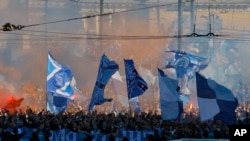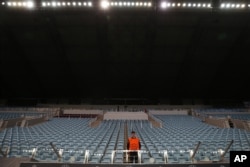A United Nations human rights panel called on the Russian Federation on Monday to step up prosecutions of racist attacks by ultra-nationalists and neo-Nazis and of hate speech by politicians.
Russian authorities must intensify measures to “vigorously combat racist behavior in sports, particularly in football, and ensure that sports regulatory bodies investigate manifestations of racism, xenophobia and intolerance,” the U.N. Committee against Racial Discrimination (CERD) said.
Fines or administrative sanctions should be imposed for such cases. The panel, referring to “the upcoming (2018) World Cup, expresses its concern that racist displays remain deeply entrenched among football fans, especially against persons belonging to ethnic minorities and people of African descent.”
Russia has pledged to crack down on racism and fan violence as it faces increased scrutiny before hosting the World Cup finals next summer. Russian Premier League champions Spartak Moscow and rivals Dynamo Moscow were each fined 250,000 rubles ($4,250) over fans’ racist behavior, the Russian Football Union (RFU) said last month.
The 18 independent experts, who reviewed Russia's record and those of seven other countries at a session that ended on Friday, issued their findings on Monday.
Igor Barinov, head of the Federal Agency for Ethnic Affairs of the Russian Federation, told the panel on Aug. 4 that Moscow had taken measures against the propagation of racist ideas.
Russia consistently combats the glorification of Nazism — made a crime in 2014 — the propaganda of Nazi ideas and attempts at racial hatred or discrimination, he said. In 2016, officials had identified 1,450 extremist crimes, 993 had been sent to court and 934 people were found guilty, he said.
The U.N. panel said violent racist attacks had decreased in recent years, but added: “Violent racist attacks undertaken by groups such as neo-Nazi groups and Cossack patrols, targeting particularly people from Central Asia and the Caucasus and persons belonging to ethnic minorities including migrants, the Roma and people of African descent, remain a pressing problem.”
It called for an end to “de facto racial profiling by the police,” decrying arbitrary identity checks and “unnecessary arrests.”
“Racist hate speech is still used by officials and politicians, especially during election campaigns, and remains unpunished,” it said, recommending investigations.
Russia still lacks anti-discrimination legislation and the definition of extremist activity in its federal law “remains vague and broad,” it said.
Regarding Crimea, seized by Russia from Ukraine in 2014, the panel voiced concern at the fate of Crimean Tatar representative institutions, such as the outlawing of the Mejlis, the Crimean Tatar's semi-official legislature, the closure of several media outlets, and “allegations of disappearances, criminal and administrative prosecutions, mass raids, and interrogations.”











